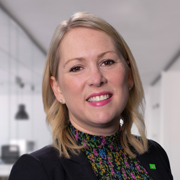2023 Key Financial Trends: what can we expect?

Guest: Geoff Bertram, Managing Director and Head of Financial Institutions Group, Investment Banking, TD Securities
Host: Amy Van Arnhem, Managing Director and Head of Canada Senior Relationship Management, TD Securities
2023 may prove to be a rigorous year for the Financial Services sector. On the latest episode of Viewpoint, listen as Geoff Bertram and host Amy Van Arnhem delve into key themes in the 2023 Financial Services sector, including the increasing value of advice and distribution, the impacts of rising interest rates, and the evolution of sustainable investing.
Listen to additional episodes for more perspectives from a variety of thought leaders on key themes influencing markets, industries and the global economy today.
ANNOUNCER: Welcome to Viewpoint, a TD Securities podcast. Listen in as we draw perspectives from a variety of thought leaders on key themes influencing markets, industries, and the global economy today. We hope you enjoy this episode.
AMY VAN ARNHEM: Hello and welcome to episode 15 of Viewpoint, a TD Securities podcast. My name is Amy Van Arnhem. I'm a senior relationship manager at TD Securities, and I will be your host for today's episode. I'm joined by my colleague Geoff Bertram, managing director investment banking.
Geoff has over 22 years in capital markets experience, including 16 years at TD in investment banking and equity capital markets. Geoff currently leads our financial institutions team in investment banking, which comprises of 20 professionals in Toronto and New York. The team focuses on everything from banks, insurance companies, wealth and asset management, and fintech. Geoff, thank you so much for joining me as we discuss some of the key themes in 2023 for the financial services industry.
GEOFF BERTRAM: Happy to be here, Amy.
AMY VAN ARNHEM: Thank you. So, Geoff, to start off with, you organize TD Securities' annual Canadian financial services conference in Toronto. Could you tell everyone a little bit more about the conference and what the key objectives are for attendees?
GEOFF BERTRAM: Absolutely. And when you say "I," I'll say we have a team that does it, and they do an excellent job of organizing the conference. There's an organizing group that sits inside of investment banking, and has done this for the last 12 years, and has done a tremendous job.
But this is a bit of a different conference than your typical investor conference, where you have CEOs or CFOs presenting company updates to a group of equity or fixed income investors. That's been done, it's done regularly, and we didn't think there was a lot of room for a conference like that.
And so, really, this conference is a bit more thematic in nature. It's evolved out of a regulatory focus conference that was started post the global financial crisis and, as I mentioned earlier, is now in its 12th year. It's intentionally quite short. It's only half a day-- four or five panels, typically are one-on-ones focusing on key issues confronting financial institutions, particularly those here in Canada. But as you would imagine, things that are going on in this market aren't necessarily just isolated to Canada. They're pervasive internationally. And so typically it's about 150 to 200 attendees, a mix of buy-side investors, corporates, private equity investors, pension funds, and regulators.
And the whole goal of this conference is we want attendees to walk away from it with a better sense as to how Canadian financial services industry is evolving. And given the regulatory environment within our sector, it's inevitable that that's a topic that gets a lot of focus at this event every year.
AMY VAN ARNHEM: So with the conference coming up, what are some of the key themes going to be?
And do you think 2023 is going to be a uniquely challenging year for the sector?
GEOFF BERTRAM: Yeah, so this year will definitely be different than those that preceded it, given the current interest rate environment and fairly broad expectation of recession sometime this year. But I want to be careful not to get too far into the realm of predictions. We have a group of experts who do that for a living here, and it's extremely challenging job, so I'm not just going to wing it.
But what I will say is that we've seen some very interesting trends develop within our space. And I think a few I'll highlight here and that will come up at the conference on January 20.
First, really, consolidation among the smaller Canadian banks is a lot of interest. We've seen much more M&A activity in the last 12 to 24 months than in the several years prior to that. Every deal had different dynamics driving it, but the one overarching thing that we see-- and it's not unique to Canada at all-- is that we're seeing in other areas, too, is frankly the importance of scale within banking.
And scale within the banking world is tremendously important. It's very costly and complex to run a core banking system. There's efficiencies of scale from funding, et cetera. There's just-- being a bigger bank, from a cost perspective, can be very beneficial. I would say that's theme number one.
Theme number two is really the increasing value of advice and distribution. And we'll come back to this probably in a future question, Amy, but I would say clients in both corporate and private equity are placing premium valuations on businesses, such as life, and property, and casualty insurance brokerage, benefits administration brokerage, wealth advisory, et cetera. These are businesses that are capital light, recurring revenue, et cetera, and we're seeing a lot of interest really across the market.
Third, rising interest rates-- can't do a conference on FIs right now without talking about rising interest rates. It's having a huge effect on our largest financial services companies, particularly the banks and insurers who should benefit as we see rates increase. But companies and investors are-- always have an eye on credit risk as well and especially as it relates to the housing market, and so there will be a housing market panel. And we'll talk a little bit about what's going on there as well because it's been a while since we've seen a significant rising interest rate environment in Canada.
And then, lastly, just to wrap is the evolution of sustainable investing in Canada and how our sector is going to support the transition to net zero emissions by 2050.
AMY VAN ARNHEM: So a lot to talk about this year for sure. And what I'd like to do is maybe dig in a little bit to some of those key topics.
GEOFF BERTRAM: Yeah.
AMY VAN ARNHEM: The first off, just talking a little bit more about rate volatility—
GEOFF BERTRAM: Yes.
AMY VAN ARNHEM: --and the reversal that we've seen in rates. As you've mentioned, this is a time we've not lived for a long time, probably not in our professional backgrounds, anyway. So what are you starting to see in terms of the effects of the interest rate reversal for the banks, and how do you foresee
they will manage through this year?
GEOFF BERTRAM: It's a good question, and, yeah, you mentioned the rising rate environment. If I were to look at where mortgage rates are today relative to where they are when I bought my first home in 2006, it actually looks pretty good by comparison still.
AMY VAN ARNHEM: Oh, really? OK.
GEOFF BERTRAM: Still, but not for long if things continue along this track. The rising interest rate environment-- this, as you said, is really the first time we've seen one in a long time. It's forcing bank treasury teams to adapt both their overall strategy and their tactics.
And, by the way, when I say treasury teams, I mean it. Canadian banks have very sophisticated and, in many cases, very large treasury groups that focus on this topic. Bank treasury teams spend a significant amount of time scenario planning for events like this-- like what we're seeing today-- but now it's being put into practice. And so it's very interesting to see what's going on right now. This is really the second paradigm shift in just a very few short years.
Remember back at the beginning of COVID in March of 2020, where liquidity was beginning to be constrained in March, and we saw a concerted effort among regulators to inundate the system with liquidity, followed by massive cash outlays by governments to businesses and families to offset, whether it's job losses, or income losses, et cetera.
We're now seeing this reversal where central banks are actively trying to withdraw liquidity from the system in an effort to cool inflation, which has resulted in, among other things, a significant increase in rates over the last year or so. This will have a number of ripple effects, but the most immediate effect from this from a bank perspective, going back to your original question, is really wholesale funding spreads, if you think about where banks raise funding in the capital markets.
And so if you're just to look at five-year senior debt, which is just a benchmark senior debt level for Canadian big banks, those spreads have increased by probably over three times in the last 12 months, so it's a huge change. That's offset somewhat by the fact that TD is one bank, and some of the other large Canadian banks have a significant deposit franchise, which is typically lower cost than wholesale funding.
It's always been a competitive advantage for any bank to have a substantial deposit franchise, but recent results have really underscored the value of this. And I think we saw that in a bunch of the bank Q4 numbers. Every large bank needs to be in the wholesale funding market. More of that that can be complemented by internally sourced deposits, the better off a bank's going to be, especially in the current rising interest rate environment.
Lastly, and not surprisingly, with rates moving as they have, we've seen some material growth in fixed term deposits against a decline in lower-cost demand and notice deposits as depositors look to get more value for their cash balances. A case in point, the value of fixed deposits is up by over a third in the last fiscal year for the banks. And so we're definitely seeing some changes that we haven't seen in a long, long time.
AMY VAN ARNHEM: And we did, of course, see one bank raise equity and others asking to comment on equity raise, so that's clearly become a theme or something that people are mindful of right now.
GEOFF BERTRAM: For sure. That changed the paradigm for equity investors. Obviously the fixed income investors benefit from this because it's more capital potentially that gets held at the banks. We did see that one bank raise equity. And I don't know if we'll see others-- it's tough to predict those things-- but definitely there was some investor focus on that one bank when they did.
AMY VAN ARNHEM: Well, this is definitely, I think, one of the more important themes for 2023, so something we'll keep an eye on as it develops. So just changing course a little bit here-- wanted to highlight one of the things you talked about, which was around distribution specific around Canadian wealth distribution. So could you speak to some of the key trends that you're seeing there and what your expectations are going forward?
GEOFF BERTRAM: Yeah, absolutely. So we're seeing significant value in distribution businesses across the FI space. And when I say "distribution" people like, OK, what's distribution? Explain that to me.
When I say distribution, I mean advice. And really, there's a premium, especially if you think about a market that we're in today, being placed on advice. And when I say advice in the financial services space, it's things like wealth advisory, but it also includes things like property and casualty insurance brokers, MGA, life insurance brokers, et cetera-- benefits.
There's all of these different advice channels. And I think the one thing that we've noticed-- that there has been a significant level of interest, particularly from the private equity side, that has put substantial capital to work in these businesses. And so we are seeing a significant increase in those valuation levels.
And, frankly, I think that's something that we expect to continue. And there's a bit of a divergence between what are called distribution businesses, which I just went through, and what I would call the manufacturing businesses, which are things like the creation of the underlying product, like a mutual fund or insurance policy. Those things are still extremely important, but there is a little bit more capital intensity to them, especially on the insurance side. Frankly, there is significant value in being the party that interfaces with the client. And so if you look at financial institutions really across the board-- and, again, this is not just a Canadian thing-- but owning your distribution is very, very important.
I mentioned PE is very active in the space. It's capital light. It's high recurring revenue. It's all those things that private equity does like. And we're seeing some corporates be quite active. So I think seeing an enhanced consolidation is something that we and, frankly, I think a lot of our-- whether it's competitors or partners on the Street-- are preparing for.
AMY VAN ARNHEM: Is there a lens on international distribution?
GEOFF BERTRAM: Yeah, it's a good question. I think international, depending on the product, is important. I think you're dealing with different regulatory regimes, you're dealing with different products depending on where you are in the world. And so I think it really depends on the company you're talking about. If you're talking about a large, global insurer, international distribution is really important. You're thinking a big-- like a Manulife or a Sun Life that are going and doing bank assurance deals in Asia, for example, you need places that you're going to-- and partners-- to help distribute the product that you're manufacturing.
AMY VAN ARNHEM: Big question. Because ESG is still something we obviously speak about and care a lot about. And I'd say for this industry specifically, defining and setting guidelines around an agreed upon sustainable finance structure, it's been a huge task and, I think, continues to be an ongoing debate. So could you speak to some of the key themes that you think will arise in 2023 for Canada?
GEOFF BERTRAM: Sure. And, again, Amy West, who leads our ESG solutions team, has done an excellent job in building a center of excellence on this topic and the broader ESG sustainable finance topic broadly at this firm, and so full credit to her.
And so what I would say is as follows. I think there is a big focus within government circles, as well as capital providers, issuers, on how we can accelerate the flow of capital to transitional and green activities in Canada. For those not following this topic very closely, this is a topic that our federal government has spent significant amounts of time on and has struck a working group on in 2021, I believe.
The Sustainable Finance Action Council, comprised of banks and other deposit takers, insurance, pension funds, with some participation from financial and securities regulators to plot a path forward. And it's not easy, right, because you've got this range of opinions and interests. Developing a transition taxonomy for Canadian financial institutions just isn't the easiest thing to do. You've got competing interests. Everybody's focused on the ultimate goal and figuring out how to achieve it. People just have different views as to how we're going to get there.
The conference panel on this topic will include two senior leaders from large Canadian pension funds as well as the CEO of one of Canada's insurers. We're are all focused on this topic and provide a bit of an update on what we're seeing. It's not done yet, but I think we're making substantial progress there.
AMY VAN ARNHEM: Does the uniqueness of the Canadian economy, in terms of the sector makeup, play a little bit more of a dynamic role here--
GEOFF BERTRAM: Absolutely, it does. And we always have to be mindful, and I want to be careful not going too far off my area of expertise. And this is where Amy and her team spend a lot of time. But, yeah, there's obviously this balance that we've made this commitment to get to net zero.
But we also need to be mindful of the fact that we have a substantial resource economy in this country, and it's not something that we're just going to forsake to get to those goals. And so we have to always keep that in mind. And so, again, I don't want to go too far off--
AMY VAN ARNHEM: Yeah, it's a balanced act, for sure.
GEOFF BERTRAM: --my area of expertise. And Amy or Drew MacIntyre, for example, have spent a lot of time thinking about this. And so we're trying to strike that balance. And it's easier said than done.
AMY VAN ARNHEM: Yeah, great. Well, Geoff, thank you so much. We look forward to the conference, and I really appreciate you joining me today.
GEOFF BERTRAM: My pleasure.
ANNOUNCER: Thank you for listening to Viewpoint, a TD Securities podcast. If you enjoyed this episode, subscribe to this series on Apple Podcasts or on your favorite podcast platform. For more thought leadership content, visit tdsecurities.com and follow us on LinkedIn for all the latest TD Securities updates. For relevant disclaimers to this podcast, please refer to the Viewpoint episode page on our website.
This podcast should not be copied, distributed, published or reproduced, in whole or in part. The information contained in this recording was obtained from publicly available sources, has not been independently verified by TD Securities, may not be current, and TD Securities has no obligation to provide any updates or changes. All price references and market forecasts are as of the date of recording. The views and opinions expressed in this podcast are not necessarily those of TD Securities and may differ from the views and opinions of other departments or divisions of TD Securities and its affiliates. TD Securities is not providing any financial, economic, legal, accounting, or tax advice or recommendations in this podcast. The information contained in this podcast does not constitute investment advice or an offer to buy or sell securities or any other product and should not be relied upon to evaluate any potential transaction. Neither TD Securities nor any of its affiliates makes any representation or warranty, express or implied, as to the accuracy or completeness of the statements or any information contained in this podcast and any liability therefore (including in respect of direct, indirect or consequential loss or damage) is expressly disclaimed.

Geoff Bertram
Managing Director and Head of Financial Institutions Group, Investment Banking, TD Securities

Geoff Bertram
Managing Director and Head of Financial Institutions Group, Investment Banking, TD Securities

Geoff Bertram
Managing Director and Head of Financial Institutions Group, Investment Banking, TD Securities
Geoff oversees our Financial Institutions Group within Corporate & Investment Banking – a team focused on providing merger, acquisition and financing advice for TD’s financial institutions clients. He has over 20 years of experience in North American capital markets. Prior to joining the Financial Institutions Group, Geoff worked for 12 years in TDS’ Equity Capital Markets group advising corporate clients on initial public offerings, follow-on offerings and equity-linked securities.

Amy Van Arnhem
Managing Director and Head of Canada Senior Relationship Management, TD Securities

Amy Van Arnhem
Managing Director and Head of Canada Senior Relationship Management, TD Securities

Amy Van Arnhem
Managing Director and Head of Canada Senior Relationship Management, TD Securities
Amy is responsible for providing holistic cross product global coverage to senior executives for Canadian institutional clients. In her role she manages stakeholder relationships by promoting a collaborative and integrated approach across the firm. Joining our firm in 2001, Amy began her career at TD in the retail sector. In 2007, she joined the Sales and Trading rotational program at TD Securities where she gained exposure in Asset Securitization, Proprietary Equity, and Institutional Equities. In 2008, she joined the Institutional Equity Sales desk team where she covered Canadian equity clients.




